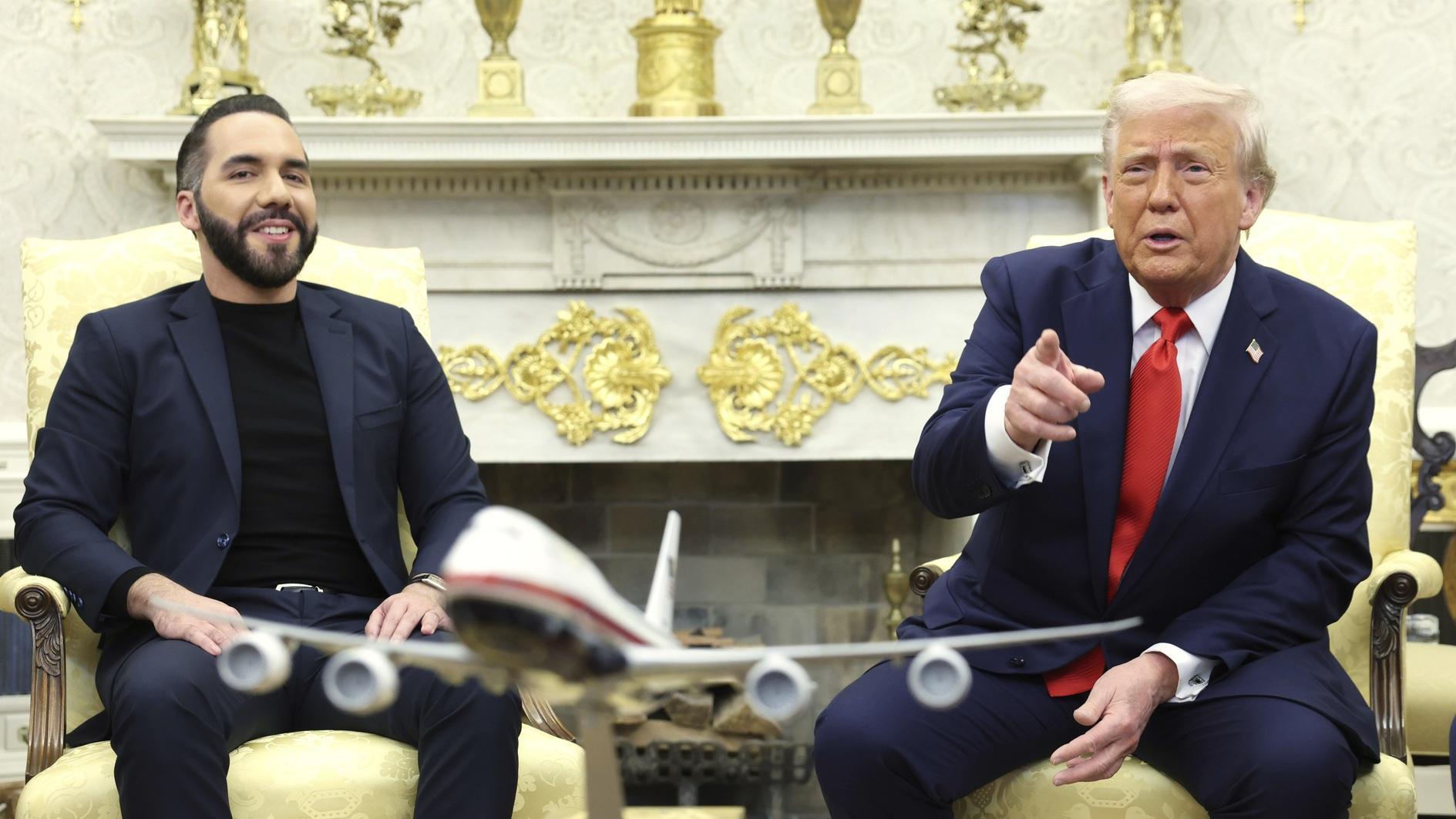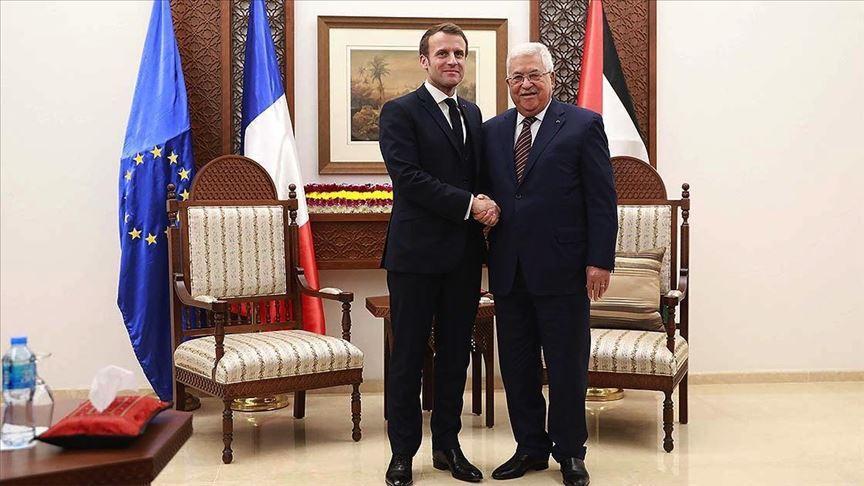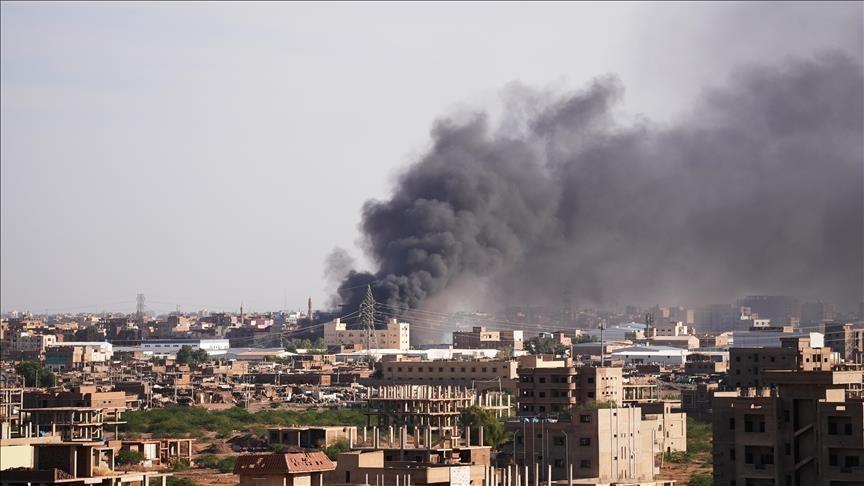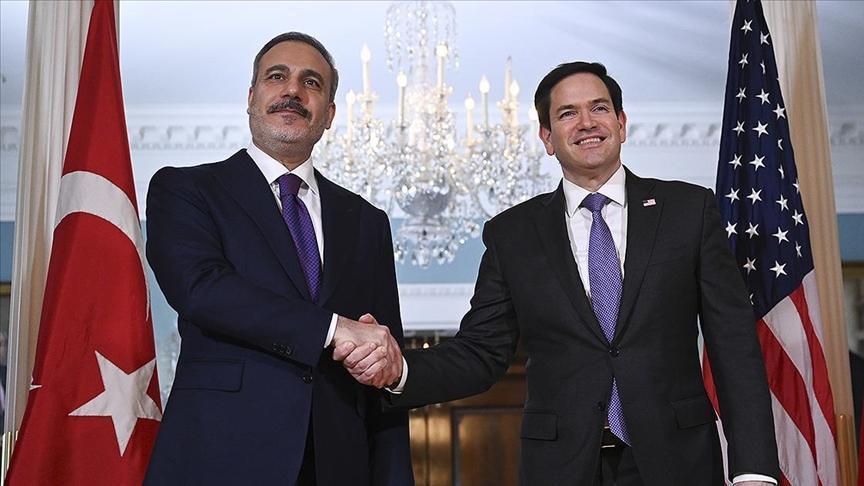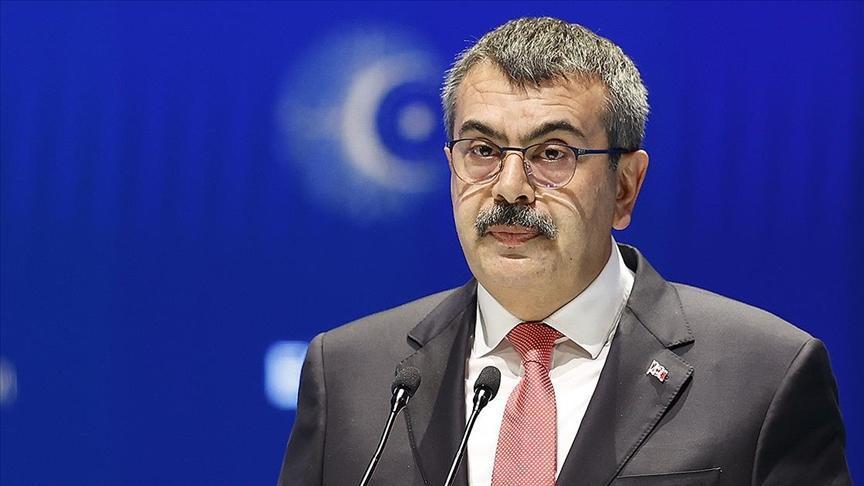Paris ‘sabotage’ will not stop talks with Öcalan
ISTANBUL - Hürriyet Daily News
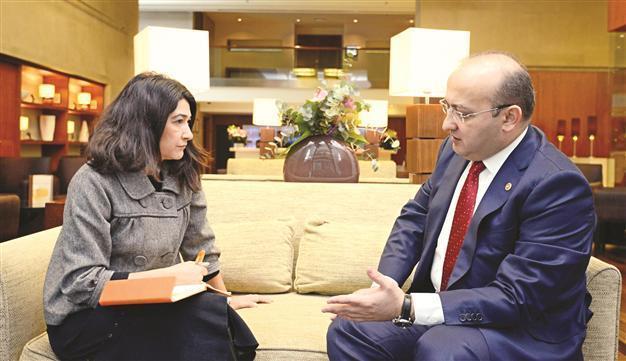 There is currently great social and political support for the peace process that started with talks held with Abdullah Öcalan, the jailed leader of the outlawed Kurdistan Workers’ Party (PKK), according to a close adviser to the Turkish prime minister. Even the execution of three female PKK members in Paris has not led society to despair, said Yalçın Akdoğan. “On the contrary, the resoluteness has been more underlined; the will to continue the process and to bring it to a solution has increased.” Those who might want to sabotage the process will not succeed, Akdoğan, a member of Parliament, told the Hürriyet Daily News in a recent interview.
There is currently great social and political support for the peace process that started with talks held with Abdullah Öcalan, the jailed leader of the outlawed Kurdistan Workers’ Party (PKK), according to a close adviser to the Turkish prime minister. Even the execution of three female PKK members in Paris has not led society to despair, said Yalçın Akdoğan. “On the contrary, the resoluteness has been more underlined; the will to continue the process and to bring it to a solution has increased.” Those who might want to sabotage the process will not succeed, Akdoğan, a member of Parliament, told the Hürriyet Daily News in a recent interview.Q: Is this a new process or should we see it as the continuation of the Oslo process [when Turkish representatives held talks with PKK representatives in Europe]?
A: Several negative developments took place during the Oslo process, which was disrupted. Today there is a new continuation in a different format. At the end of the day it is not a direct continuation of the Oslo process. The parameters and format are different. Today there is a process that is taking place through İmralı [the island prison where PKK leader Abdullah Öcalan is jailed].
The Peace and Democracy Party (BDP) has become part of the process, and now we are at the point of [seeing] how the calls by Öcalan will be answered. We can say that we are at a better point when comparing the two processes.
Q: What makes you say that?
A: First, the fact that the BDP, which had complained then of being excluded, has now entered more into the process. Today the social and political support is greater. At that time there were too many polemics within the opposition parties. The [recent] statement of Fethullah Gülen carries great importance.
The PKK at that time considered itself more powerful and failed in the delusion that it could come to a point through armed struggle, which disrupted the Oslo process. Then the state challenged the PKK.
The PKK used all its power but could not get a result either in city centers or in rural areas. It saw that this method was futile. Today we have a PKK whose expectations [of gaining a result through armed struggle] have lowered and whose armed power has been weakened.
In addition we know that certain dark forces that were trying to sabotage the process were much more powerful at that time. Today they have been weakened as well. We can especially say that civil-military relations today have normalized more and the harmony between different state organs is much better. The prime minister’s statement that in case of retreat there won’t be operations should be read in this respect.
In summary the process started at a time when the hands of Turkey and the government are stronger and negative factors have been left more behind.
Q: You claim that Öcalan has switched to a different paradigm.
A: Öcalan thought mistakenly, ‘The more the PKK attacks the more I will be considered as the interlocutor; the state will have to see me as the interlocutor.’ He saw that it was not the case, because the state shut the doors. Öcalan saw that the more the PKK took action the more he was ruled out as an interlocutor; the more he was being buried in İmralı.
Q: Where are we right now?
A: When we look to the social perceptions we see that there is a more optimistic atmosphere. The sabotage, even the latest incidents, did not lead society to despair. On the contrary, the resoluteness has been more underlined, I see that the will to continue the process and to bring it to a solution has increased.
Q: You believe that the murders in Paris have not hampered the process.
A: I believe that they will bring about an outcome opposite to the one intended. Some people may have tried to sabotage [the process] but the will for a solution in society is so strong that I don’t think they will sabotage the process.
Q: How did you read these murders?
A: Everybody focuses on the possibility of sabotage or provocation. Obviously it carries a great meaning. There is talk that this might involve the hands of those who are uneasy with the process.
There have been cases in the past when women’s groups have had conflicts inside the organization.
This women’s group has a particular importance. There have been comments that they would position themselves closer to İmralı and give a stronger response to Öcalan’s calls. The comments from the [PKK] Europe wings point toward the conviction that it is sabotage by those opposing the process. But they object to the theory of an intra-organizational execution and try to attribute it to some other places. But everybody agrees that this is sabotage.
This is a situation that harms France’s reputation. The fact that something like that took place in the middle of Paris is a big intelligence failure. That’s why shedding light on the incident as soon as possible will decrease the damage inflicted on France’s prestige. [French President François] Hollande’s statement that they frequently used to meet one of the murdered women is a political gaffe. How can you exonerate excessively someone who has been sought after with a red bulletin, a person who has been subject to official correspondence between security mechanisms?
Q: How should we read the reaction of the prime minister to France?
A: Turkey has not seen serious support from European countries in its fight against terror. They say we are friends and allies but we see a different approach to the fight against terror. The terror organization is doing very serious work in Europe, and these activities are perceived as normal and Turkey’s demands for cooperation against terrorism are not met.
Q: Independent of these murders, you had previously said that Western countries are also playing an important role in this process.
A: There are countries that do not want to see the PKK out of the regional equation, that want to use the PKK as an instrument. They do not necessarily have to be countries that want to harm Turkey. I tried to say that those who look to be friendly to Turkey are also using this instrument or that by avoiding supporting Turkey’s struggle sufficiently lend indirect support [to terror].
In addition to countries that want to break Turkey’s regional influence and harm its regional interests, there are also countries that want to weaken Turkey’s regional influence while appearing friendly to Turkey.
Q: Would you categorize France as such?
A: I am criticizing France and Germany for not lending the necessary support to the fight against terror. In the region, in each incident, there are new positionings; those that looked hostile to each other until recently can develop different collaborations. On the PKK issue it is not right to think categorically and with classic rhetoric. The balances in the region can change at any time.
Q: There seems to be a more integrative approach this time; does that involve dealing with the foreign actors as well?
A: Diplomacy is obviously an important dimension in solving all these issues. You can’t reach your desired destination by neglecting diplomacy. It is important that we explain what we are doing to all the allies and neighbors so that they see the right picture.
Q: What is the message that is given by the Paris murders: Is it a ‘We don’t want the negotiation process’ or ‘We want to be included, you need to take us into account’ type of message?
A: It seems more on the side of ‘We don’t want it.’ If it is an internal execution the messages to the internal dynamics [of the organization] will become more important. That’s why it is more meaningful to comment about it after the [incident] is solved.
Q: Doesn’t this incident underline the question of to what degree it is possible to continue the process with Öcalan, as there are also suspicions about to what degree he controls the organization, which seems to have several power centers?
A: It is precisely for this reason that Öcalan was shown as the right address. It was said, ‘This can’t take place without Öcalan, and he represents us all.’ Currently, all the sub-groups or affiliations or whatever you call it, they all say ‘I am here too; it won’t work if I am not in.’ That I don’t find proper. I perceive it as dragging the feet. This renders Öcalan meaningless and weakens his position.
Statements of [Murat] Karayılan as to the substance and talking about a roadmap carry the meaning of imposing their will on Öcalan.
Q: What is the framework of the process: silencing the weapons, or laying down weapons in exchange for providing democratic rights to Turkey’s Kurds?
A: It would be wrong to frame it like that. What they [the PKK] mean by silencing arms is a situation where they do not attack. In wintertime they don’t take action anyway. So that does not carry a meaning. A serious step is to retreat behind borders. Disarmament carries a meaning. We are not talking about laying down arms and taking them up again when they wish. We are talking about the elimination of arms. Let me emphasize the detail here: When we say elimination of arms, there is propaganda made by the PKK that interprets it as elimination of the PKK, which creates a negative atmosphere in the organization toward the process. The aim here is laying down arms, and this means retreating outside the country. This is not an outcome that we will reach after the government takes several steps as they [the PKK] claim. Retreating outside the country is the first step. The process gains a meaning if this step takes place.
I do not find it right to say that the issues of our Kurdish citizens are a matter of negotiation.
This is not a give-and-take negotiation. This is a talking process that has a specific aim. We have never made any of the issues of Kurdish citizens a matter of negotiation with any organization. We have taken several steps up to this day and we did this because our citizens deserved it. We never acted with such a psychology that whenever the organization took too much action, we stopped taking steps or decided to take steps fearing the organization might attack. The due rights of our citizens are never an issue of negotiation. Nor are they a favor from the state.
Q: But there is the process of rewriting the Constitution.
A: Indexing the Constitution process to the [negotiation] process is to abuse the constitutional process and to render it unfruitful. Reading the constitutional process by indexing it to the ongoing talks will poison the constitutional process.
Q: But the constitutional process is critical to solving the Kurdish issue.
A: Let’s say these talks will last one or two years, but the Constitution [Conciliation] Commission is going to work a couple of months more. That’s why they are not processes that can be indexed to each other.
Q: It is said that Kurds are concerned that the process was initiated as a tactic in view of the prime minister’s plans for the 2014 presidential elections. That the prime minister is trying to buy time.
A: This is not a tactical initiative. If it was an initiative to make political gains or to buy time the process would have started at the end of 2013.
Q: Going beyond borders is not going to end the problem.
A: It does not; of course this is just a step. The aim is to lay down arms.
Q: But how about afterward, what will the people do after disarmament?
A: These are details that it would not be right for me to talk about, but the process will also show us the way. It is not right to make advanced comments from today. There are several stages we need to pass though before coming to that point.
Q: It is said that the high-level cadres of the PKK are mostly Kurds from other countries. Will that not complicate the process?
A: The fact that the organization is active in other countries and has members who are citizens of foreign countries does provide the grounds for the organization to be influenced by different power centers. We will see in time to what degree Öcalan has influence over these groups.
Q: How did you read Ahmet Türk’s statements about Öcalan’s emphasis on a democratic solution?
A: This is a more rational, more reasonable line. I took Karayılan’s statement as an effort to
counterbalance this stance. Öcalan would draw a lower profile, the other will take the stakes higher, but this harms Öcalan’s position. At any rate if we are to find a solution, that can only be found at a moderate point. You can incite your masses and swing to an extreme point where there is no solution anyway. The difficulty they face both in the BDP and Kandil [Mountains, the headquarters of the PKK] is to swing back from the extreme to a more moderate point. In this instance the big mass has turned to one point, but the locomotive has not yet turned its face. The BDP supporters took this process positively, and the wagons turned in the direction pointed by Öcalan. But the locomotive looks somewhere else. This stems from the fact that the BDP and Kandil can’t change the point where they have swung. Öcalan seems to slide to a more rational point and we will see in time, but the other related groups are facing more difficulties.
Q: How do you see the position of opposition parties?
A: It is important that the BDP is in the process. They can assume important missions, but they need to focus on the result and not opt to make political gains from the process. The [Republican People’s Party] CHP’s initial reaction is positive but not enough. This is a long process. The support should continue during the whole process over concrete developments. You can’t say you support it and say something different and make a polemic at each concrete development. This is also about the CHP getting an inner consensus. Sometimes there are different voices. The [Nationalist Movement Party] MHP’s stance is just about rhetoric.
Q: What’s next?
A: The sides need to clarify their positions. It is important to see the reactions to Öcalan’s appeal. There needs to be a concrete position before concrete steps. We need to see who says what.
Who is Yalçın Akdoğan?
Yalçın Akdoğan, the chief adviser to Turkish Prime Minister Recep Tayyip Erdoğan, has been present across almost all of the prime minister’s contacts for the past decade.
Born in Istanbul in 1969, Akdoğan graduated from Anatolia University’s Communication Sciences Faculty in Eskişehir. He completed his master’s degree at the same university’s Institute of Social Sciences, followed by a doctorate in the Social Sciences faculty of Istanbul’s Marmara University in 2007.
He started his journalistic career as an intern at daily Milliyet, before founding a local daily, called “Central Anatolia” (İç Anadolu). He currently writes columns at the dailies Yeni Şafak and Star.
His relationship with the prime minister dates back to the mid-1990s. He came to Ankara in the 2000s and started to work in Parliament as an adviser to Erdoğan, before going on to the prime ministry. He then started to head the group of Erdoğan’s speechwriters.
Akdoğan was elected as an Ankara deputy from the Justice and Development Party (AKP) in the 2011 general election and he currently chairs Parliament’s Human Rights Investigation Commission.
The author of eight books, he has had numerous articles published in newspapers and magazines.


